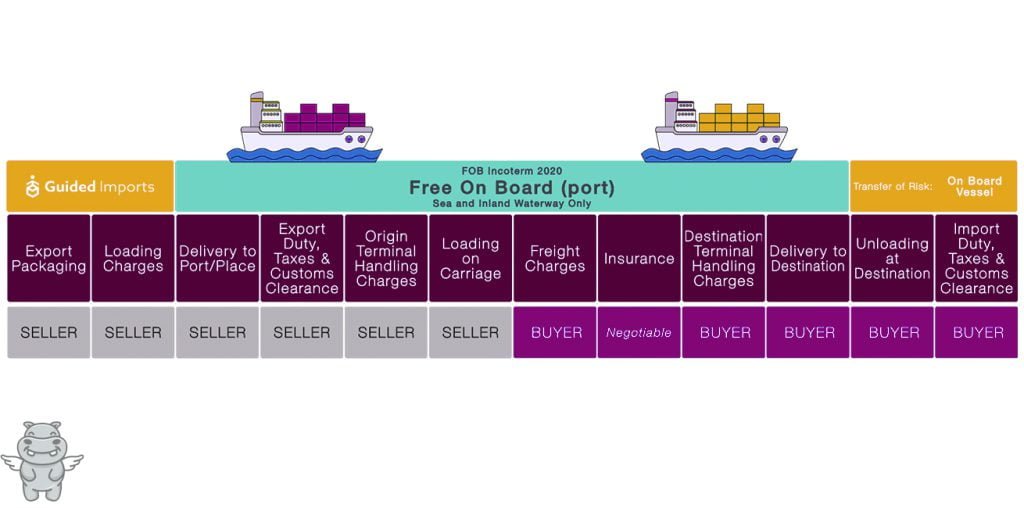What does FOB Incoterms mean?
FOB Incoterms is an international agreement on the responsibilities and conditions of sale between a seller and a buyer. The term FOB is short for “Free On Board” which means that the seller will not be responsible for any additional costs incurred in loading the goods onto a vessel.
The FOB Incoterm is a term used to determine how much risk a buyer takes on when purchasing goods from a seller that is located outside their country.
FOB is the most common agreement between a buyer and a seller in a foreign country when goods are shipped by sea. This Incoterm is only used for shipping by sea or maritime transport.
As a result, FOB shipping means that the supplier keeps ownership and responsibility for the goods until they are loaded “on board” a shipping vessel. Once the goods are on the ship, the buyer is responsible for everything.
FOB only works for transport by sea or inland waterway. So, the place with the name is always a port. It doesn’t matter if the main mode of transport is by air, land, or rail.
What are the advantages of FOB?
FOBhipofly.com/incoterms-guide/"> Incoterms are good for the buyer because they give them the most control over logistics and shipping costs. This gives them the freedom to choose how they want to ship the goods.
FOB lets the buyer choose which freight forwarder they want to use for the whole shipment. Instead of leaving part or all of the freighting process up to the supplier. The buyer only has to work with one hipofly.com/">shipping company throughout the whole process. This reduces the amount of back and forth and the chance of miscommunication between the two companies.
FOB Incoterms are also the most affordable option because the buyer can shop around for the best shipping rate. Even though the risk is transferred when the goods are safely loaded onto the ship, the buyer’s forwarder is in charge of the whole shipping process. Once the load leaves the seller’s warehouse, the buyer is in charge of it and has a better chance of making sure the shipment goes well.
FOB Incoterms are also good for sellers because as soon as the cargo leaves their factory, the sale is done.

Here is a list of all the pros of FOB incoterms:
FOB combines risk and control
Most of the time, FOB is the best way for importers to balance risk and control.
FOB includes customs clearance
Clearing export customs can be hard, especially if the importer doesn’t know much about the laws in the country where the goods came from.
Under FOB, it is the supplier’s job to get the goods through customs when they leave the country. This includes getting the export clearance documents at the port or terminal. This could save the importer a lot of time, trouble, and even money.
FOB is cost-effective
Under FOB, the importer can control the shipping process once the ship leaves the port in the seller’s country. However, the importer doesn’t have to figure out how to get the goods from the seller’s warehouse to the port, which can be hard if the importer doesn’t know much about the seller’s country.
What are the disadvantages and risks of using FOB terms?
There are also some possible downsides to using FOB terms that you should be aware of
Higher unit prices
Most of the time, the unit price of goods to be shipped FOB is higher than the unit price of goods shipped Ex Works (also called EXW). But this doesn’t always mean that the total cost will go up, since this price already includes some of the costs of shipping.
Suppliers might add a markup to the local shipping costs
Because you don’t have control over how your products get to the port in the country of origin, you can’t be sure you’ll get the best deal. You might find that the supplier adds a certain amount to the actual costs and keeps it as their own profit.
Who pays for freight when using FOB?
Freight on board, also known as FOB shipping point, is a type of sale in which the buyer pays for the goods before they are shipped. Shipping costs are also paid for by the buyer. At the seller’s shipping point, ownership of the goods changes hands.
FOB Incoterm responsibilities
Here, we take on all responsibility in terms of FOB
Seller’s Responsibilities
Here, we take on all responsibility in terms of FOB
- Providing the goods according to the sales contract
- delivering goods from the warehouse, where they were produced, to the shipping location
- Delivery cost to the point of destination (in FOB Destination)
- Export license
- Commercial Invoice
- Packing list
- Export packaging
- Export clearance, duty, and taxes
- Loading costs
- Terminal handling charges
- Proof of delivery documents
- Any additional local charges and other costs, such as inspections in the origin country
Buyer’s responsibilities
In FOB, the buyer is responsible for:
- buying the goods according to the sales contract
- Inspection before shipment from the shipping point
- Freight transportation from the shipping point (in FOB Origin)
- Unloading goods at the destination port
- Any further inland transportation to the final destination
- Ocean freight receipts
- Goods invoice
- Import formalities, such as import clearance, taxes, and duties

Conclusion
When FOB shipping terms are used, the buyer and seller of goods share the costs, risks, and responsibilities about the same amount. On FOB terms, your supplier is responsible for all costs related to your shipment until the goods are on a ship at their outbound port. FOB Shanghai, for example, means that your supplier is responsible for the goods until they are loaded onto the ship at Shanghai. After this point, it’s up to you to take care of things.
If you want to ship a package from China, you will have to use FOB terms. This is one of the most popular terms used by buyers when they buy anything from China.
FAQs
What are FOB Incoterms?
Free on Board, or FOB, is an Incoterm that means the person selling the goods is responsible for getting them on the ship and paying for all costs. Once the goods are safe on the ship, the risk moves to the buyer, who is then responsible for the rest of the transport.
FOB is the most common agreement between a buyer and a seller in a foreign country when goods are shipped by sea. This Incoterm is only used for shipping by sea or inland waterway.
What are the differences between FOB and CIF?
The main difference between CIF and FOB is who is in charge of the goods while they are being shipped. In a CIF agreement, the seller is responsible for the goods while they are in transit. In a FOB agreement, the buyer is responsible for the goods while they are in transit. Aside from that, there isn’t much else that sets them apart.
What are the Seller’s Responsibilities in FOB?
When a seller signs a sales contract with the Incoterms of FOB, he or she is responsible for the following: Export Packaging, Loading Charges, Delivery to Port, Export Duty, Taxes & Customs Clearance, Origin Terminal Handling Charges, Loading on Carriage
What are the Buyer’s Responsibilities in FOB?
When a buyer agrees to buy goods under the Incoterms of FOB, they agree to take on the following risks and responsibilities: Freight Charges, Insurance, Destination Terminal Handling Charges, Delivery to Destination, Unloading at Destination, Import Duty, Taxes & Customs Clearance




No comment